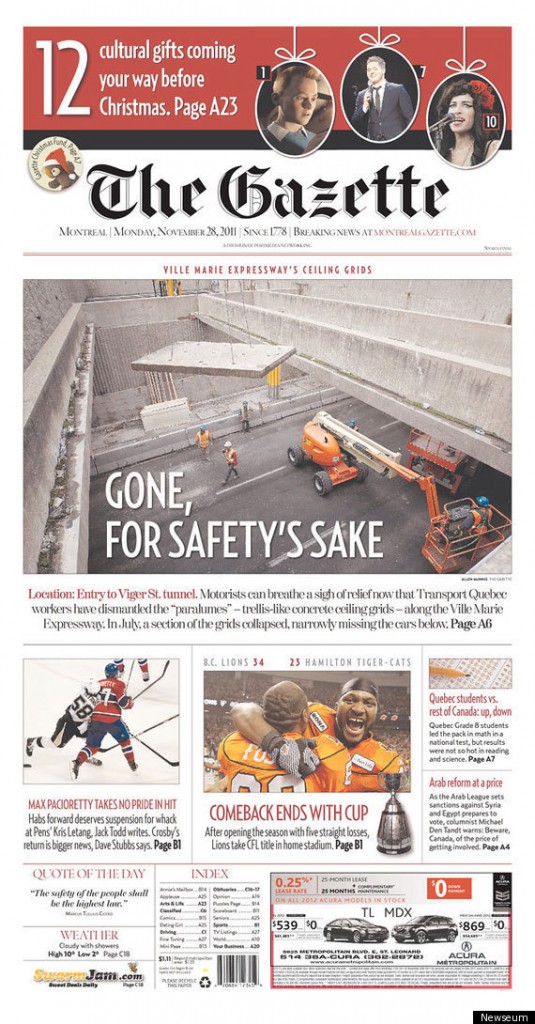Cet article du Christian Science Monitor, intitulé Is the death of newspapers the end of good citizenship? a pas mal circulé (du moins dans certains cercles) sur les médias sociaux ces jours-ci.
C’est à lire au complet. Voici quelques passages, parmi ceux qui m’ont le plus frappée; et quelques questions que cela soulève.

En l’absence de journaux, qu’est-ce qui alimente la conversation commune?
« More of American life now occurs in shadow. And we cannot know what we do not know, » said Tom Rosenstiel, the director of the Pew Research Center‘s Project for Excellence in Journalism, testifying at a 2009 Congressional Joint Economic Committee hearing on the future of news.
New research suggests that fewer people vote after their communities lose a daily print newspaper. Fewer run for office. Fewer boycott – or buy – something based on what they think of a company’s values. Fewer contact public leaders to voice opinions. Fewer pitch in with neighborhood groups. More incumbent politicians get reelected. And these things happen despite the presence of digital and broadcast media.»
N’est-ce pas étrange, après qu’on ait tellement dit et écrit comment internet d’abord, puis les médias sociaux par la suite, allaient rendre l’information plus accessible que jamais, favoriser la participation, etc. ? J’ai quelques pistes pour les réponses plus tard, mais continuons avec l’article du Christian Science Monitor.
«Tom Stites founded the Banyan Project – an initiative to develop reader-owned, online news cooperatives, which he incubated as a fellow at Harvard‘s Berkman Center for Internet & Society – because he worries about « news deserts. »
« A news desert is a community whose sources of original reporting have dried up entirely, or are diminished to the point where they can no longer fill the information needs of the communities they serve, » he explains.»
Un autre expert cité, Lee Shaker, un professeur de communications à Portland State University en Oregon s’est penché sur les disparitions des versions imprimées du Rocky Mountain News à Denver et du Seattle Post-Intelligencer. Sa première observation : « They were deeply embedded in their communities, in terms of people waking up in the morning and reading them and also as clearinghouse institutions where reporters had spent their entire careers, » Shaker says. « [The reporters] knew how things worked and could shed light on the truth. » Et puis : « Even though Denver and Seattle were each left with one daily print paper – previously, both had been two-newspaper towns – the change was significant. Shaker saw a decline in certain public-minded behaviors, including boycotts, which outpaced other cities.
The data did not explain why. So, asks Shaker: « Did civic engagement decline because people stopped reading a newspaper? Or because you took a newspaper out of the community? » After all, newspapers play a dual role: keeping readers informed and acting as watchdogs.
Having a paper around, Shaker adds, « is a public good we all benefit from, even if we don’t read it, because it means journalists are pounding the pavement, holding officials accountable, activating the community. »
Une autre étude, qui selon le Christian Science Monitor, doit être publiée bientôt dans le Journal of Media Economics, s’est penchée sur la disparition du Cincinnati Post, en 2007 : « «What we found was that, relatively speaking, fewer people ran for municipal office, incumbents became more likely to be reelected, candidates spent less on their campaigns, and voter turnout fell in the suburbs that got the most coverage from the Post, » says economist Sam Schulhofer-Wohl, the study’s lead author and a former newspaperman.»
Et de la part de Terry Francke, aussi cité dans l’article, qui s’est penché sur le même genre de cas à Orange County en Californie : «The result need not be on paper, but it must be done with the community memory and professional savvy almost unique to newspaper-trained journalists with experience watching small-town politics.»
La question bien sûr, ce n’est pas forcément celle du support papier, mais celle du journalisme, et aussi de son financement, donc du modèle d’affaires des médias dédiés à l’information.
Mais il y a quand même quelque chose que ni le web, ni même les éditions sur iPad et autres tablettes, ne sont pas encore arrivés à remplacer. Je l’avais déjà écrit dans ce billet :
«Il y a des fonctions du journal papier auxquelles on n’a pas encore trouvé de remplacement avec internet. Ainsi, nulle part ailleurs, on n’a ce côté « arrêt sur image » de l’actualité. Si je jette ne serait-ce qu’un rapide coup d’oeil aux « unes » de La Presse, du Journal de Montréal, du Devoir et de The Gazette d’aujourd’hui, j’ai une fichue bonne idée de ce qui va être « the talk of the town » aujourd’hui. Et, parce que je reçois mon Globe and Mail à l’aube tous les matins, j’ai tout de suite une idée des sujets qui ont une certaine importance au Canada anglais (même chose, sur le plan de l’économie, en regardant leur sectionReport on Business). Même exercice pour les États-Unis, et pour New York, si je feuillette le New York Times. Cette hiérarchie visuelle, liée à la taille de l’article dans la page, la taille du titre, et de la photo, on ne la retrouve pas vraiment avec internet.»
Et je citais aussi ce texte de Stuart MacLean, auteur et animateur de l’émission The Vinyl Café, sur CBC Radio:
« I love newspapers because they exist in space, but not in time. They happen out of time. In fact, they literally stop time. Every day the newspaper jams its wrench in the cogs of the clock and says, “This is what it is like right now.” And by doing that, it asks that of all of us. It asks us to step out of time too, and to consider the things that are happening, and what they might mean to us, and to others and what we think about all that.
Perhaps the most important thing is that a newspaper is a shared experience, on every level. Not only the shared experience of a boy listening to his father grumble about the news, as my father used to when he read the paper before dinner.
There is all that, but there is more. When our cities are full of newspapers, they are, quite literally, on every corner. And that means you don’t even have to read them to know what they are on about. You just have to walk around and they will seep into you like ink spilled on a blotter and, in the spilling, will stain your mind. And that means we are all ink-stained. Those of us who read the papers, and those of us who don’t. And this is the important part. We are stained with the same stories, and because of that, all of us, living together, can carry on a common conversation. »
Et en effet, c’est cette conversation commune qui s’éteint tranquillement. Qu’y a-t-il pour prendre la place ?

 Follow
Follow

0 Commentaires.